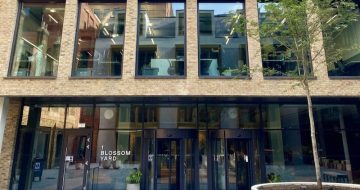Report finds virtual law school meets standards in five key areas but falls short in two

The higher education regulator has identified several areas where the College of Legal Practice (COLP) must improve its support for students and staff if it wants to secure full degree awarding powers.
The virtual law school gained new degree awarding powers (DAPs) in late 2021, triggering a probationary period from February 2022 to April 2025. This opened the door for it to expand beyond SQE preparation and offer postgraduate courses, including LLMs.
Last summer, the Office for Students carried out a routine assessment to decide whether the College meets the criteria for full degree awarding powers (DAPs) and can move beyond its probationary period.
The report, recently published online and running to 112 pages, found that while the College received passing marks in five key areas, it fell short in two.
The College’s CEO, Dr Giles Proctor, told Legal Cheek that it welcomed the review, which highlighted its progress, and remained confident it would be awarded full DAPs within the next three years.
Two areas where the College did not meet the required standard were “quality of academic experience” and “scholarship and pedagogical effectiveness of staff”.
On the first point, the report found that while the College met several requirements in how it designs and delivers courses, assessors raised concerns about how it “maintains social learning environments” and prevents “unacceptable academic practice”.
The report notes that although the College provides access to online learning portals, it had not “addressed the sense of a lack of social learning community expressed by students”, which had “led to the creation of, and a heavy reliance on, student-led WhatsApp groups as the main mechanism of a social learning environment”.
The College — a relative newcomer to the UK education market, having launched in 2019 as an offshoot of the College of Law Australia and New Zealand — was also flagged for “significant weaknesses” in detecting plagiarism and cheating on its courses, with assessors expressing concern that no potential academic misconduct had been detected during the College’s probationary period. They described this as “unusual and particularly concerning”.
With regard to the “scholarship and pedagogical effectiveness of staff”, the report notes that while the College has recruited tutors and staff capable of delivering “high quality teaching”, there is insufficient evidence that everyone involved is appropriately supported and developed to the required level. This, the report adds, includes “providing adequate opportunities for staff to engage in reflection and evaluation of their learning, teaching and assessment practice”.
So, while the College met the required standards in areas such as academic governance, academic standards, regulatory frameworks, and the environment for supporting students, falling short in the other two categories meant it also failed to meet the final, overarching criterion. This requires a provider to be a “self-critical, cohesive academic community with a proven commitment to the assurance of standards supported by effective quality systems”.
The College — which works with firms including Reed Smith, Accutrainee and Ashfords — can continue offering its postgraduate courses.
The Office for Students has agreed to extend the College’s probationary period by 36 months, until April 2028, giving it time to address the issues highlighted in the report and ensuring that current students remain unaffected.
In a statement to Legal Cheek, the College’s CEO, Dr Giles Proctor said:
“We greatly valued the recent Office for Student (OfS)’s review which validates the progress we have made. As a new law school, we are proud to have achieved probationary DAPs status and to have successfully met most of the full DAPs criteria. This puts us in a strong position to be awarded full DAPs within the next three years.
We are especially pleased with the OfS’ positive recognition of our academic standards, regulatory framework, governance, and the student experience at the College.
To progress to full DAPs, we are actively collaborating with the OfS on two key areas, ‘Enhancing the Academic Experience’ and ‘Scholarship and Pedagogical Effectiveness’. On the former, we are working to strengthen our virtual community and social learning environment for postgraduate students, many of whom are earning and learning. Our current research with students is focused on identifying the types of support that would be most valuable to them. We have also implemented a plagiarism software, Turnitin, and an AI framework to uphold academic integrity across our programmes. On the latter, we are expanding opportunities for our experienced academic team, that includes experienced postgraduate tutors, solicitors and barristers, to engage in external scholarly activity and further embedding this into their teaching practice. This includes the introduction of Advance HE Fellowships.
We are confident that, once these final criteria are met and subject to final review, we will be awarded full DAPs.”


